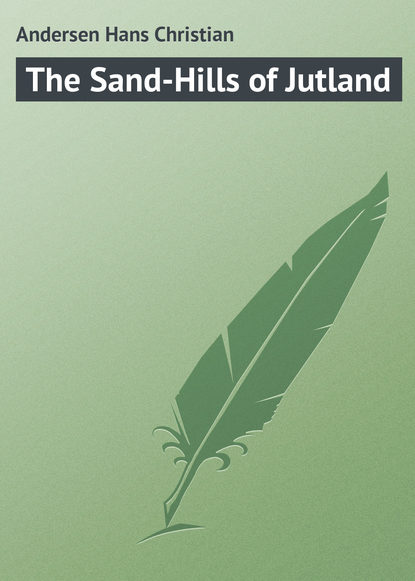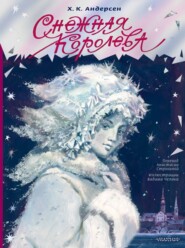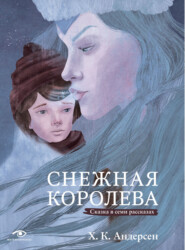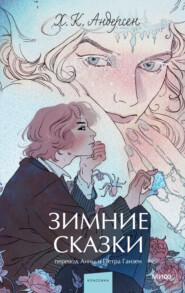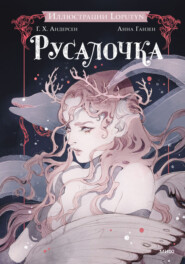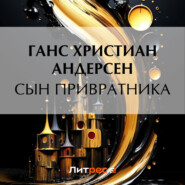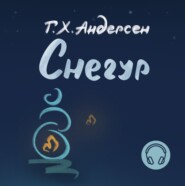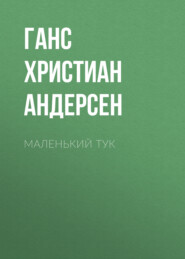По всем вопросам обращайтесь на: info@litportal.ru
(©) 2003-2024.
✖
The Sand-Hills of Jutland
Настройки чтения
Размер шрифта
Высота строк
Поля
And so it was. Helga saw, comprehended it all, and sank on her knees.
The sun burst forth in all its morning splendour, and as, in former days, with its first rays fell the frog disguise, and the lovely form became visible; so now, in the baptism of light, arose a form of celestial beauty, purer than the air, as if in a veil of radiance to the Father above. The body sank into dust, and where she had stood lay a faded lotus flower!
"Well, this is a new finale to the story," said the stork-father, "which I by no means expected; but I am quite satisfied with it."
"I wonder what the young ones will say to it?" replied the stork-mother.
"Ah! that, indeed, is of the most consequence," said the stork-father.
The Quickest Runners
There was a large reward offered – indeed, there were two rewards offered, a larger and a lesser one – for the greatest speed, not in one race alone, but to such as had got on fastest throughout the year.
"I got the highest prize," said the hare. "One had a right to expect justice when one's own family and best friends were in the council; but that the snail should have got the second prize I consider as almost an insult to me."
"No," observed the wooden fence, which had been a witness to the distribution of the prizes; "you must take diligence and good will into consideration. That remark was made by several very estimable persons, and that was also my opinion. To be sure the snail took half a year to cross the threshold; but he broke his thigh-bone in the tremendous exertion which that was for him. He devoted himself entirely to this race; and, moreover, he ran with his house on his back. All these weighed in his favour, and so he obtained the second prize."
"I think my claims might also have been taken into consideration," said the swallow. "More speedy than I, in flight and motion, I believe no one has shown himself. And where have I not been? Far, far away!"
"And that is just your misfortune," said the wooden fence. "You gad about too much. You are always on the wing, ready to start out of the country when it begins to freeze. You have no love for your fatherland. You cannot claim any consideration in it."
"But if I were to sleep all the winter through on the moor," inquired the swallow – "sleep my whole time away – should I be thus entitled to be taken into consideration?"
"Obtain an affidavit from the old woman of the moor that you did sleep half the year in your fatherland, then your claims will be taken into consideration."
"I deserved the first prize instead of the second," said the snail. "I know very well that the hare only ran from cowardice, whenever he thought there was danger near. I, on the contrary, made the trial the business of my life, and I have become a cripple in consequence of my exertions. If any one had a right to the first prize it was I; but I make no fuss; I scorn to do so."
"I can declare upon my honour that each prize, at least as far as my voice in the matter went, was accorded with strict justice," said the old sign-post in the wood, who had been one of the arbitrators. "I always act with due reflection, and according to order. Seven times before have I had the honour to be engaged in the distribution of the prizes, but never until to-day have I had my own way carried out. My plan has always hitherto been thwarted – that was, to give the first prize to one of the first letters in the alphabet, and the second prize to one of the last letters. If you will be so good as to grant me your attention, I will explain it to you. The eighth letter in the alphabet from A is H– that stands for Hare, and therefore I awarded the greatest prize to the Hare; and the eighth letter from the end is S, therefore the Snail obtained the second prize. Next time the I will carry off the first prize, and R the second. A due attention to order and rotation should prevail in all rewards and appointments. Everything should go according to rule. Rule must precede merit."
"I should certainly have voted for myself, had I not been among the judges," said the mule. "People must take into account not only how quickly one goes, but what other circumstances are in question; as, for instance, how much one carries. But I would not this time have thought about that, neither about the hare's wisdom in his flight – his tact in springing suddenly to one side, to put his pursuers on the wrong scent, away from his place of concealment. No; there is one thing many people think much of, and which ought never to be disregarded. It is called the beautiful. I saw that in the hare's charming well-grown ears; it is quite a pleasure to see how long they are. I fancied that I beheld myself when I was little, and so I voted for him."
"Hush!" said the fly. "As for me, I will not speak; I will only say one word. I know right well that I have outrun more than one hare. The other day I broke the hind legs of one of the young ones. I was sitting on the locomotive before the train: I often do that. One sees so well there one's own speed. A young hare ran for a long time in front of the engine: he had no idea that I was there. At length he was just going to turn off the line, when the locomotive went over his hind legs and broke them, for I was sitting on it. The hare remained lying there, but I drove on. That was surely getting before him; but I do not care for the prize."
"It appears to me," thought the wild rose, but she did not say it – it is not her nature to express her ideas openly, though it might have been well had she done so – "it appears to me that the sunbeam should have had the first prize of honour, and the second also. It passes in a moment the immeasurable space from the sun down to us, and comes with such power that all nature is awakened by it. It has such beauty, that all we roses redden and become fragrant under it. The high presiding authorities do not seem to have noticed it at all. Were I the sunbeam, I would give each of them a sunstroke, that I would; but it would only make them crazy, and they will very likely be that without it. I shall say nothing," thought the wild rose. "There is peace in the wood; it is delightful to blossom, to shed refreshing perfume around, to live amidst the songs of birds and the rustling of trees; but the sun's rays will outlive us all."
"What is the first prize?" asked the earth-worm, who had overslept himself, and only now joined them.
"It gives free entrance to the kitchen garden," said the mule. "I proposed the prize, as a clear-sighted and judicious member of the meeting, with a view to the hare's advantage. I was resolved he should have it, and he is now provided for. The snail has permission to sit on the stone fence, and to enjoy the moss and the sunshine; and, moreover, he is appointed to be one of the chief judges of the next race. It is well to have one who is practically acquainted with the business in hand – on a committee, as human beings call it. I must say I expect great things from the future – we have made so good a beginning."
The Bell's Hollow
"Ding-dong! ding-dong!" sounded from the buried bell in Odensee river. What sort of a river is that? Every child in the town of Odensee knows it. It flows round the foot of the gardens, from the locks to the water-mill, away under the wooden bridges. In the river grow yellow water-lilies, brown feather-like reeds, and the soft velvet-like bulrushes, so high and so large. Old, split willow trees, bent and twisted, hang far over the water by the side of the monks' meadows and the bleaching greens; but a little above is garden after garden – the one very different from the other; some with beautiful flowers and arbours, clean and in prim array, like dolls' villages; some only filled with cabbages; while in others there are no attempts at a garden to be seen at all, only great elder trees stretching themselves out, and hanging over the running water, which here and there is deeper than an oar can fathom.
Opposite to the nunnery is the deepest part. It is called "The Bell's Hollow," and there dwells the merman. He sleeps by day when the sun shines through the water, but comes forth on the clear starry nights, and by moonlight. He is very old. Grandmothers have heard of him from their grandmothers. They said he lived a lonely life, and had scarcely any one to speak to except the large old church bell. Once upon a time it hung up in the steeple of the church; but now there is no trace either of the steeple or the church, which was then called Saint Albani.
"Ding-dong! ding-dong!" rang the bell while it stood in the steeple; and one evening when the sun was setting, and the bell was in full motion, it broke loose, and flew through the air, its shining metal glowing in the red sunbeams. "Ding-dong! ding-dong! now I am going to rest," sang the bell; and it flew out to Odensee river, where it was deepest, and therefore that spot is now called "The Bell's Hollow." But it found neither sleep nor rest there. Down at the merman's it still rings; so that at times it is heard above, through the water, and many people say that its tones foretell a death; but there is no truth in that, for it rings to amuse the merman, who is now no longer alone.
And what does the bell relate? It was so very old, it was there before our grandmothers' grandmothers were born, and yet it was a child compared with the merman, who is an old, quiet, strange-looking person, with eel-skin leggings, a scaly tunic adorned with yellow water-lilies, a wreath of sedges in his hair, and weeds in his beard. It must be confessed he was not very handsome to look at.
It would take a year and a day to repeat all that the bell said, for it told the same old stories over and over again very minutely, making them sometimes longer, sometimes shorter, according to its mood. It told of the olden days – the rigorous, dark times.
To the tower upon St. Albani Church, where the bell hung, ascended a monk. He was both young and handsome, but had an air of deep melancholy. He looked through an aperture out over the Odensee river. Its bed then was broad, and the monks' meadows were a lake. He gazed over them, and over the green mound called "The Nuns Hill," beyond which the cloister lay, where the light shone from a nun's cell. He had known her well, and he remembered the past, and his heart beat wildly at the recollection.
"Ding-dong! ding-dong!" This was one of the bell's stories: —
"There came up to the tower one day an idiot servant of the bishop; and when I, the bell, who am cast in hard and heavy metal, swung about and pealed, I could have broken his head, for he seated himself immediately under me, and began to play with two sticks, exactly as if it had been a stringed instrument, and he sang to it thus: 'Now I may venture to sing aloud what elsewhere I dare not whisper – sing of all that is kept hidden behind locks and bolts. Yonder it is cold and damp. The rats eat the living bodies. No one knows of it; no one hears of it – not even now, when the bell is pouring forth its loudest peal – ding-dong! ding-dong!'
"There was a king: he was called Knud. He humbled himself both before bishops and monks; but as he unjustly oppressed the people, and laid heavy taxes on them, they armed themselves with all sorts of weapons, and chased him away as if he had been a wild beast. He sought shelter in the church, and had the doors and windows closed. The furious multitude surrounded the sacred edifice, as I heard related; the crows and the ravens, and the jackdaws to boot, became scared by the noise and the tumult; they flew up into the tower, and out again; they looked on the multitude below, they looked also in at the church windows, and shrieked out what they saw.
"King Knud knelt before the altar and prayed; his brothers Erik and Benedict stood guarding him with their drawn swords; but the king's servitor, the false Blake, betrayed his lord. They knew outside where he could be reached. A stone was cast in through the window at him, and the king lay dead. There were shouts and cries among the angry crowd, and cries among the flocks of frightened birds; and I joined them too. I pealed forth, 'Ding-dong! ding-dong!'
"The church bell hangs high, sees far around, receives visits from birds, and understands their language. To it whispers the wind through the wickets and apertures, and through every little chink; and the wind knows everything. He hears it from the air, for it encompasses all living things; it even enters into the lungs of human beings – it hears every word and every sigh. The air knows all, the wind repeats all, and the bell understands their speech, and rings it forth to the whole world – 'Ding dong! ding dong!'
"But all this was too much for me to hear and to know. I had not strength enough to ring it all out. I became so wearied, so heavy, that the beam from which I hung broke, and I flew through the luminous air down to where the river is deepest, where the merman dwells alone in solitude; and here I am, year after year, relating to him what I have seen and what I have heard. 'Ding-dong! ding-dong!'"
Thus rang the chimes from "The Bell's Hollow" in the Odensee river, as my grandmother declares.
But our schoolmaster says there is no bell ringing down there, for it could not be; and there is no merman down there, for there are no mermen; and, when all the church bells are ringing loudly, he says that it is not the bells, but the air that makes the sound. My grandmother told me that the bell also said this; so, since the schoolmaster and the bell agree in this, no doubt it is true.
The air knows everything. It is round us, it is in us; it speaks of our thoughts and our actions; and it proclaims them farther than did the bell now down in the Hollow in Odensee river, where the merman dwells – it proclaims all out into the great vault of heaven, far, far away, even into eternity, up to where the glorious bells of paradise peal in tones unknown to mortal ears.
Soup made of a Sausage-stick
I
"We had a capital dinner yesterday," said an aged female mouse to one who had not been at the feast. "I sat only twenty-one from the old King of the Mice: that was not being badly placed. Shall I tell you what we had for dinner? It was all very well arranged. We had mouldy bread, the skin of bacon, tallow candles, and sausages. Twice we returned to the charge: it was as good as if we had had two dinners. There was nothing but good-humour and pleasant chit-chat, as in an agreeable family circle. Not a mite was left except the sausage-stick. The conversation happened to fall upon the possibility of making soup of a sausage-stick. All said they had heard of it, but no one had ever tasted that soup, or knew how to prepare it. A health was proposed to the inventor, who, it was remarked, deserved to be superintendent of the poor. Was not that witty? And the old King of the Mice arose and declared that the one among the young mice who could prepare the soup in question most palatably should be his queen, and he would grant them a year and a day for the trial."
"Well, that was not a bad idea," said the other mouse. "But how is the soup made?"
"Ay, how is it made? That was what they were all asking, the young and the old. Every one was willing enough to become the queen, but they were all loath to take the trouble of going out into the world to acquire the prescribed qualification; yet it was absolutely necessary to do so. But it does not suit every one to leave her family and her snug old mouse-hole. One cannot be going out every day after cheese parings, and sniffing the rind of bacon. No: such pursuits, too often indulged in, would perchance put them in the way of being eaten alive by a cat."
These apprehensions were quite terrible enough to scare most of the mice from going forth upon the search of knowledge. Only four presented themselves for the undertaking. They were young and active, but very poor. They would have gone to the four corners of the earth, if only good fortune might attend their enterprise. Each of them took with her a sausage-stick to remind her what she was travelling for. It was to be her walking staff.
On the 1st of May they set out, and on the 1st of May, a year after, they returned; but only three of them. The fourth did not report herself, and sent no tidings of herself; and yet it was the day fixed for the royal decision.
"There shall be no sadness or no drawback to our pleasure," said the King of the Mice, as he gave orders that every mouse within several miles round should be invited. They were to assemble in the kitchen. The three travelled mice were drawn up in a row alone. In the place of the fourth, who was absent, was deposited a sausage-stick covered with black crepe. No one ventured to utter a word until the three had made their statements, and the king had determined what more was to be said.
We have now to hear all this.
II.
WHAT THE FIRST LITTLE MOUSE HAD SEEN AND LEARNT ON HER JOURNEY
"When I first went forth into the wide world," said the little mouse, "I thought, as so many of my age do, that I had swallowed all the wisdom of the earth; but that was not the case – it required a year and a day for that to come to pass. I went at once to sea, on board a ship which was bound for the north. I had heard that cooks at sea were pretty well acquainted with their business; but there is little to do when one has plenty of sides of bacon, barrels of salt meat, and musty meal at hand. One lives delicately on these nice things; but one learns nothing like making soup of a sausage-stick. We sailed for many days and nights, and a stormy and wet time we had of it. When we reached our destination I left the vessel: this was far away up in the north.
"One has a strange feeling on leaving one's own mouse-hole at home, being carried away in a ship, which becomes a home for the time, and suddenly finding one's self, at the distance of more than a hundred miles, standing alone in a foreign land. I saw myself amidst a large tangled wood full of pine and birch trees. Their scent was so strong! It is not at all my taste; but the perfume from the wild plants was so spicy that I was quite charmed, and thought of the sausage and the seasoning for the soup. There were lakes amidst the forest, the water was beautifully clear close at hand, but looking in the distance as black as ink. There were white swans upon the lake. I mistook them at first for foam, they lay so still; but when I saw them fly I recognised them. They, however, belong to the race of geese. No one can deny his kindred. I like mine, and I hastened to seek the field mice, who, truth to tell, know very little except what concerns their food; and it was just that on account of which I had travelled to a foreign country. That any one should think of making soup out of a sausage-stick seemed to them so extraordinary an idea, that it was speedily circulated through the whole wood; but that the problem should be solved they considered an impossibility. Little did I think then that the very same night I should be initiated into the process.
"It was midsummer; therefore it was that the woods scented so strongly, they said; therefore were the plants so aromatic in their perfume, the lake so clear, and yet so dark with the white swans upon them. On the borders of the forest, amidst three or four houses, was erected a pole as high as a mainmast, and around it hung wreaths and ribbons. This was the Maypole. Girls and young men danced round it, and sang to the accompaniment of the fiddler's violin. All went on merrily till after the sun had set, and the moon had risen, but I took no part in the festivity; for what had a little mouse to do with a forest ball? I sat down amidst the soft moss, and held fast my sausage-stick. The moon shone brightly on a place where there was a solitary tree surrounded by moss so fine – yes, I venture to say as fine as the Mice-King's skin – but it had a green tint, and its colour was very soothing to the eye. All at once I saw approaching a set of the most beautiful little people, so little that they would only have reached to my knee; they looked like men and women, but they were better proportioned. They called themselves Elves, and their garments were composed of the leaves of flowers, trimmed with the wings of gnats and flies – not at all ugly. They seemed as if they were searching for something – what I did not know; but when they came a little nearer to me their leader tapped my sausage-stick, and said, 'This is what we want; it is all ready, all prepared;' and he became more and more joyful as he gazed upon my walking-stick.





